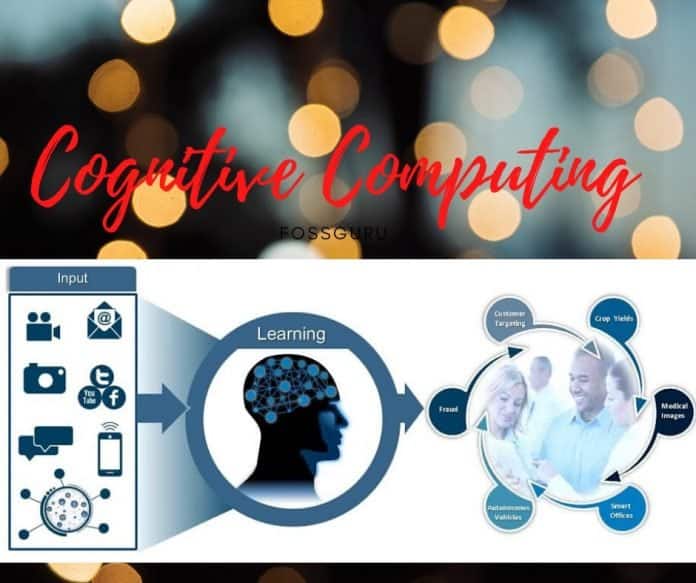Cognitive Computing is a problem solving and decision-making approach that combines hardware and software to make a function of a natural cognitive process. It is a combination of learning, perception, and motivation. In the learning process, we design how to get the data and improve performance through experience and training. The perception we discuss how to get data from the learning. In the motivation, process guides the data for a better result.
What is Cognitive Computing?
Cognitive Computing is a simulation of the idea of the human brain. It is a blend of artificial intelligence, machine learning, sentiment analysis, contextual awareness, natural language processing, and neural network. It is used in artificial intelligence and machine learning to generate an idea and used inexperienced learning for the future. This line is capable to feed data from an intelligence algorithm to analyze and understand the correlation to automatically improve its intellect.
This type of computing is a learning technique can mimic the human brain. Someone is considering it as cognitive computing systems (CCS). CCS medicine from the complex situation by gathering there is data through sensors and processes through natural Language processing, sentiment analysis, and machine learning. Many machine learning provider is offering artificial intelligence that can be used to create a complex block of CCS.
The Technology Behind Cognitive Computing
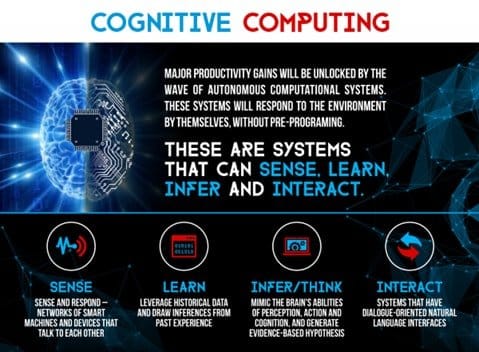 To understand cognitive computing we have to know about big data machines, learning and cloud computing. Those are the key factors behind its mechanism. Here is the details study link for better understanding.
To understand cognitive computing we have to know about big data machines, learning and cloud computing. Those are the key factors behind its mechanism. Here is the details study link for better understanding.
How Cognitive Computing Works
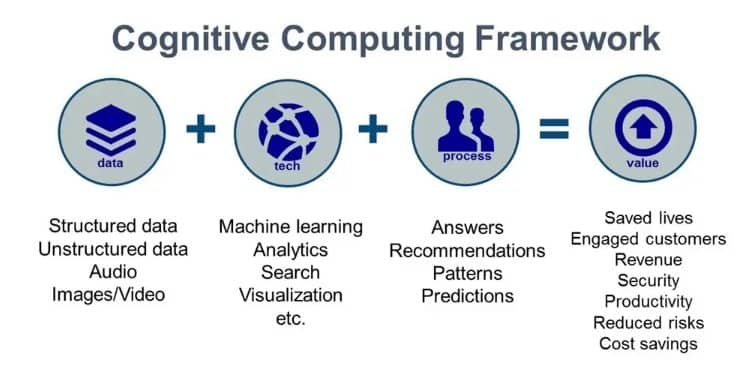 Cognitive Computing system simplifies data from various information sources. After finishing the information the conflicting evidence and context suggest a suitable answer. To facilitate this process the cognitive learning systems use data mining, pattern recognization natural language processing.
Cognitive Computing system simplifies data from various information sources. After finishing the information the conflicting evidence and context suggest a suitable answer. To facilitate this process the cognitive learning systems use data mining, pattern recognization natural language processing.
To solve the problem by humans requires the use amount of structure and unstructured data cognitive computing soft the same problem bye pattern recognization and model possible solution.
The cognitive computing systems analyze data from different sources to recommend the best possible answers. It works through self-learning, data mining, pattern recognition, and natural language processing to work as brain systems.
Could help the computer to solve these difficult types of problem where it is the requirement of a vast amount of structure and unstructured data through the machine learning algorithms. Here the cognitive system is capable to refine the pattern and accept the new pattern of problems. To work with these types of pattern cognitive computing requires five types of the key attribute which is known as a consortium.
Adaptive: first of all the cognitive Computing should be adaptive. So, it should be much more flexible to understand the changes in the data structure. Also, the system should be able to digest the dynamic data in real-time. It should be also capable to make adjustment and adaptive.
Interactive
Human-computer interaction is a critical component in cognitive systems. in the system, the user must be capable to interact with the cognitive machine and find their needs. This technology will also be capable to interact with other processes, devices, and cloud platforms.
Iterative and Stateful
In this system, the process can be capable to identify the requirement by asking a question or pulling additional data to make the system complete. Based on the previous experience the system does the job.
Contextual
The cognitive system must understand to identify and mine contextual data such as syntax, time, domain, location, specific user profile, task, and goals. They may on multiple sources of information including structure, unstructured data, visual, audio and sensor data.
How Cognitive Computing Differs From Artificial Intelligence?
Cognitive computing is referred to as a subset of artificial intelligence. there are differences and similarities between the two. So now have a check the difference between artificial intelligence and cognitive computing.
the technology behind cognitive computing and artificial intelligence are similar. Deep learning, machine learning, neural network, and natural language processing are composed of both of them. But after having much more similarity is there are some differences.
Cognitive computing focuses on mimicking human behavior and reasoning to solve complex problems. It is capable to simulate the thought of the human process and find the solution to the complex problem. to make the human decisions this simple supplement information for humans. These types of computing most used in customer service, healthcare, and manufacturing industries.
That official intelligence augments human thinking to solve the complex problem of humans. This type of solution providers accurate results. it. The pattern to learn or reveal will hidden information and find possible solutions. It is responsible for making decisions by minimizing the role of humans. The organization of artificial intelligence in the manufacturing industry, retail, healthcare, security, and financial sector.
Difference by example
To make clear the idea we can provide an example that will help you to understand in detail. An image well explains in detail.
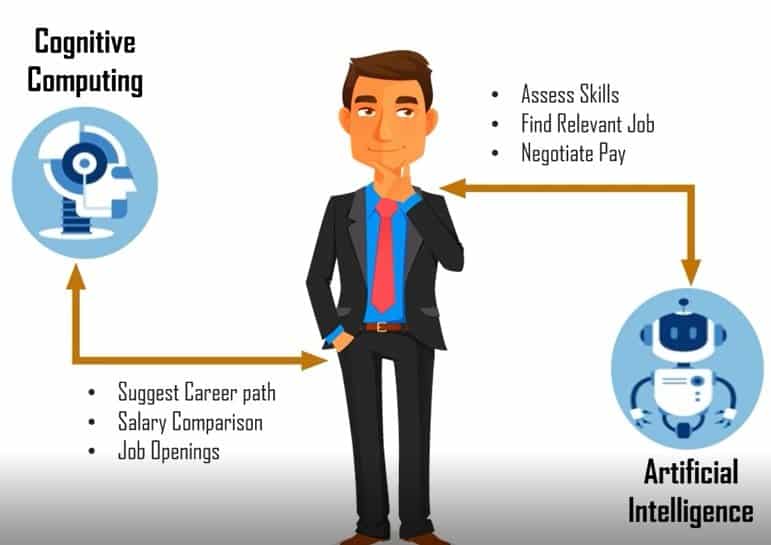
In this image, we have seen that a person is facing a problem with taking any decision about his right career path. On his left side artificial intelligence and cognitive computing. In artificial intelligence the key points are asses skills, find the relevant job and negotiate pay. But in the cognitive computing suggest potential career path, salary comparison data, and open job position. The final decision-maker is the human himself but artificial intelligence shows the route cause of using the career and cognitive computing helps to leverage the decision for himself.
Application of cognitive Artificial Intelligence
There are lots of applications in cognitive computing. It can solve logical reasoning and better decisions making. Some of the remarkable application of cognitive computing are:
Chatbot
 A chatbot is used to simulate human conversation with a machine in a contextual sense. Natural language processing machine learning technique used for that purpose. This technique allows the machine to get input from humans and provide logical answers based on analytics. Cognitive computing is applied here to enable chatbot to have a certain level of intelligence communication. The chatbot provides a suggestion, recommendation and swift answer based on previous experience at instruction.
A chatbot is used to simulate human conversation with a machine in a contextual sense. Natural language processing machine learning technique used for that purpose. This technique allows the machine to get input from humans and provide logical answers based on analytics. Cognitive computing is applied here to enable chatbot to have a certain level of intelligence communication. The chatbot provides a suggestion, recommendation and swift answer based on previous experience at instruction.
Sentiment Analysis
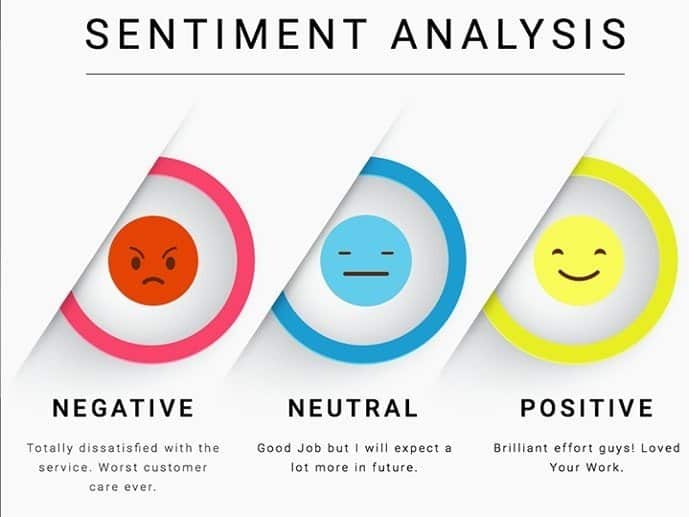 Cognitive computing understands the sentiment of the human being. It is applied to perceive the emotion and convey it in communication. To integrate human communication with the machine we need to feed the training data of human conversation. It is widely used in social media like Facebook and Twitter for comments, status, and tweets.
Cognitive computing understands the sentiment of the human being. It is applied to perceive the emotion and convey it in communication. To integrate human communication with the machine we need to feed the training data of human conversation. It is widely used in social media like Facebook and Twitter for comments, status, and tweets.
Face Detection
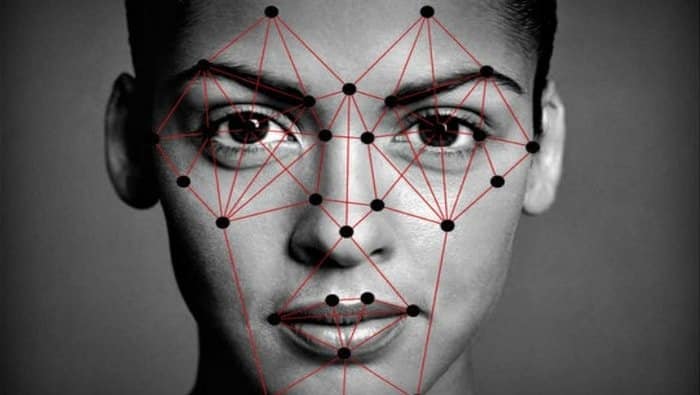 The advanced level of image analysis is face detection. Cognitive computing systems are also applied here. This system takes input from the various data structure, for example, eye color, contour, etc. With the help of this computing, we get the 3D image which is more accurate than 2D. In the Door security system, laptop/mobile login process this computing is vastly used.
The advanced level of image analysis is face detection. Cognitive computing systems are also applied here. This system takes input from the various data structure, for example, eye color, contour, etc. With the help of this computing, we get the 3D image which is more accurate than 2D. In the Door security system, laptop/mobile login process this computing is vastly used.
Fraud Detection
 With the help of cognitive computing, we identify fraudulent transactions. It finds out the abnormalities in transactions. Based on the previous experience it judges the authenticity of transactions. To get the better result cognitive use decision tree, random forecasting, clustering, and logistics regression.
With the help of cognitive computing, we identify fraudulent transactions. It finds out the abnormalities in transactions. Based on the previous experience it judges the authenticity of transactions. To get the better result cognitive use decision tree, random forecasting, clustering, and logistics regression.
Smart IoT
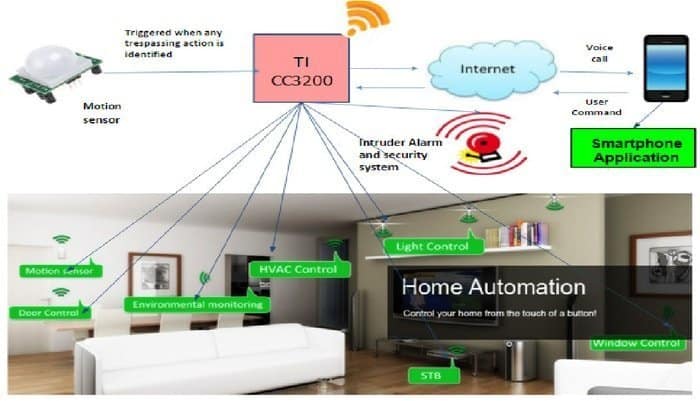 Most of the home appliance is now IoT enabled. In IoT based manufacturing and industrial system, we can use cognitive computing for better accuracy in the decision-making process. IoT is also applied in healthcare and the cognitive process can effectively support the architecture.
Most of the home appliance is now IoT enabled. In IoT based manufacturing and industrial system, we can use cognitive computing for better accuracy in the decision-making process. IoT is also applied in healthcare and the cognitive process can effectively support the architecture.
Artificial Intelligence Enabled Cybersecurity
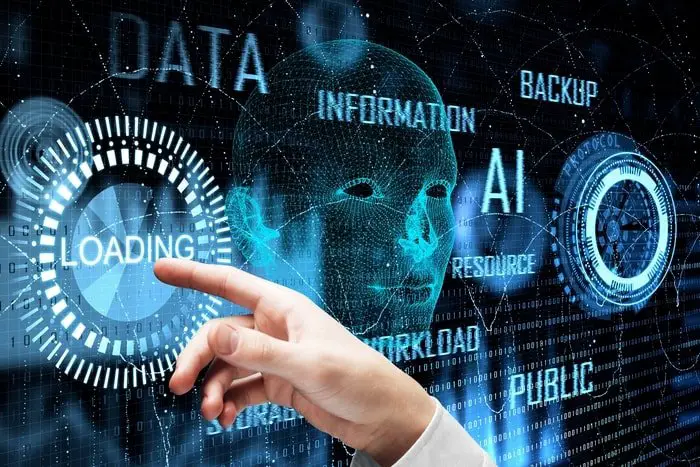 Cybersecurity is a bad word in the modern technological world. To ensure better security in cyberspace artificial intelligence contributed to the biggest roll. To support more in the security sector cognitive processing also integrating with artificial intelligence. It has enhanced the sequential analysis of situation development.
Cybersecurity is a bad word in the modern technological world. To ensure better security in cyberspace artificial intelligence contributed to the biggest roll. To support more in the security sector cognitive processing also integrating with artificial intelligence. It has enhanced the sequential analysis of situation development.
Content Artificial Intelligence
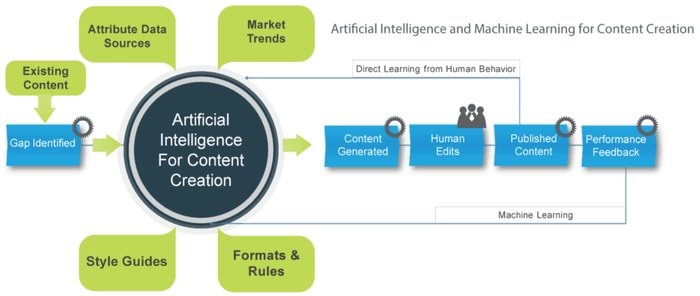 A solution powered by cognitive intelligence continuously learns and reasons and simultaneously integrates location, time of the day, user habit, symmetric intensity, intend, sentiment, social media contextual awareness, and other personal attributes.
A solution powered by cognitive intelligence continuously learns and reasons and simultaneously integrates location, time of the day, user habit, symmetric intensity, intend, sentiment, social media contextual awareness, and other personal attributes.
Final Thought
So cognitive computing refers to individual technologies that perform a specific task to facilitate human intelligence. Since the beginning of the internet boom, it is working as a decision support system. To get analysis from a big amount of information, it is better data and a better analysis process.
Cognitive Computing also considered as understanding and simulating reasoning, human behavior, and better human decisions from the machine. Speech recognization, sentiment analysis, face detection symmetric assessment is the popular solution of these types of computing.





